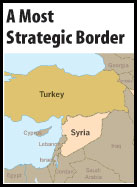CQ TODAY ONLINE NEWS
May 30, 2012 – 10:42 p.m.
Levin Sees Role for Turkey in Curbing Syria
By Emily Cadei and Frank Oliveri, CQ Staff
The Senate’s top defense policy lawmaker predicted Wednesday that the international community will have to take additional action to stop the bloodletting in Syria, and that Turkey will most likely have to be at the heart of any solution to ease strongman Bashar al-Assad from power.
The comments by Senate Armed Services Chairman

|
||
|
They come after a weekend massacre of government opponents in the town of Houla, which has prompted European nations and the Obama administration to harden their stances against Assad. More than 100 people were reportedly killed in the attack, nearly half of them children. Evidence indicates that some were killed execution-style.
While other lawmakers in recent days have called for the United States to assert itself more in responding to the violence in Syria, Levin said Wednesday that Turkey, a NATO member, will have to be the one to take the lead to resolve the crisis across its border. Ankara is already sheltering Syrian opposition leaders and providing refuge to thousands of refugees who have fled the violence.
Based on a visit to Turkey earlier this month, Levin said officials there were hesitant to get any more involved in the crisis, but that they also recognized that they may be asked to play a bigger role. Senate Majority Whip
“I think they might be willing, should NATO and the world community urge them,” to create a safe zone in Syria along the border with Turkey, Levin said. “How big a zone it would be is hard to predict.”
Levin said it would then be incumbent upon NATO and the United States to provide support to Turkey in the form of equipment, logistics and intelligence.
“But clearly, no [U.S.] boots on the ground the way there would be Turkish boots,” he said. “I doubt there would even be U.S. air power. It would mainly be intelligence, to the extent we could have drones available to provide intelligence.”
Establishing a Partnership
Sen.
“I know that every effort will be made to have him leave office voluntarily,” Nelson continued. “But on the other hand, after talking to the Saudis, if that is not successful, military intervention is inevitable.”
Like Levin, however, Nelson said the United States should work multilaterally if possible. “The question is if we can establish a partnership, rather than have the United States take the only role in working for regime change in Syria,” Nelson said.
Levin Sees Role for Turkey in Curbing Syria
The administration has walked a careful line on Syria, condemning the violent suppression of demonstrations but stopping well short of advocating a more active intervention. On Wednesday, the Treasury Department expanded the scope of U.S. sanctions on Damascus by adding another Syrian bank to its list of prohibited entities related to the regime’s suspected proliferation of weapons of mass destruction.
The White House has tried to emphasize a multilateral approach, highlighted by this week’s coordinated expulsion of senior Syrian diplomats from European capitals and Washington. Officials continue to downplay military options but insist that nothing has been ruled out.
“We do not believe that militarization, further militarization of the situation in Syria at this point is the right course of action,” White House spokesman Jay Carney said May 29. “We believe that it would lead to greater chaos, greater carnage.”
There is no clear consensus in Congress on Syria.
Leading Republican Sens.
“Until we get serious about helping the Syrian people defend themselves, find safe haven and fight back against Assad, the killing will continue, and we will be shamefully complicit,” McCain said.
Other lawmakers, however, have been extremely wary of letting the U.S. get dragged into a complicated conflict that is likely to have regional implications well beyond Syria’s borders. Sen.
And Republicans on the Senate Foreign Relations Committee, including
Unlike McCain and other hawks in Congress, Levin concurred with the Obama administration’s renewed attempt to engage Russia and persuade the Kremlin to help push Assad from power.
“The most likely form of military intervention would be if the world community is unable to persuade Assad, and Russia will not join the rest of the world in putting pressure on Assad,” Levin said. “Then Turkey should next be looked at as a source of creating a safe zone right on the border inside of Syria.”